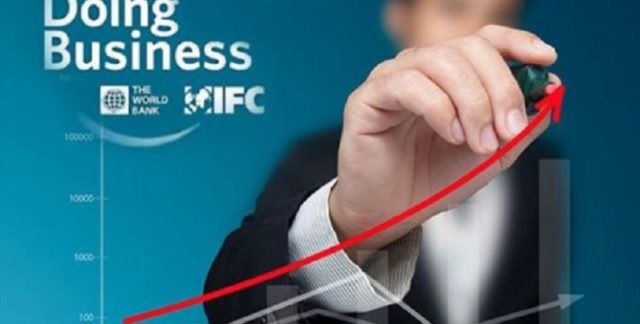Albania climbed only two steps to rank 63rd out of 190 global economies for the ease of doing business, continuing to lag behind most of its regional competitors ranking in the top 50.
The 2019 Doing Business report published by the World Bank, a reference point in foreign investors’ decision-making, shows Albania sole reform in this year’s ranking was in enforcing contracts.
“Albania made enforcing contracts easier by amending the code of civil procedure to establish a simplified procedure for small claims and introduce time standards for certain court events,” shows the report.
Yet, enforcing contracts, an indicator measuring the time and cost for resolving a commercial dispute at a local first-instance court and the quality of judicial process, ranks Albania’s 98th, compared to 120th last year, unveiling the ongoing poor confidence in the highly perceived inefficient and corrupt judiciary which is undergoing long-awaited reform with the vetting of judges and prosecutors over their wealth and professionalism.
Dealing with construction permits, getting electricity and paying taxes are Albania’s worst indicators in the report with little progress over the past few years despite the country having introduced e-permits, improved access to electricity following a failed privatization of electricity distribution operator and introduced electronic filing of taxes.
Paying taxes ranks Albania the world’s 122nd worst performer with medium-sized companies spending an average of 252 hours a year and having to pay about 37.3 percent of their profit in taxes and contributions, higher even compared to 36.6 percent in Serbia, the region’s largest economy.
Total tax and contribution rate as a percent of profit in other regional economies range from as low as 13 percent in Macedonia, 15.2 percent in Kosovo, 22.2 percent in Montenegro and 23.7 percent in Bosnia and Herzegovina, shows the report.
Albania’s total tax and contribution rate is composed of 14 percent in profit tax, 18.8 percent in labor tax and contributions and 4.4 percent in other municipal fees and vehicle taxes.
Trading across borders, protecting minority investors, resolving insolvency and getting credit ranks Albania on the top 50.
The high tax burden, corruption and inefficient judiciary are the main concerns facing local and foreign businesses in Albania complaining of Albania being uncompetitive to other regional countries applying flat tax regimes of about 10 percent.
Macedonia was the Western Balkans top performer for several years in a row as it climbed to the 10th best global destination for the ease of doing business, followed by Kosovo 44th, Serbia 48th, Montenegro 50th and Bosnia and Herzegovina 89th.
Albania has been the region’s second largest foreign direct investment recipient for the past decade, but FDI has mainly focused on low value added energy sector such as oil, mining and hydropower.
Regional reports show Albania’s top ten companies continue to be dominated by energy-related and telecommunication companies unlike some of the region’s main competitors where the automobile industry is one of the key drivers of economy and employers.
Albania has managed to attract only about a tenth of the inward foreign direct investment stock in the Western Balkans in an FDI race that is led by Serbia, the region’s largest economy.
IMF research shows Albania is the third largest recipient in terms of FDI stock with a 10 percent share among the six Western Balkan economies, lagging behind Bosnia and Herzegovina with a 12 percent share and Serbia with a 55 percent share alone.
Albania faces a serious challenge next year when the Trans Adriatic Pipeline and the Devoll Hydropower, the two major energy-related projects that drove FDI growth in the past four years complete their investment stage and no major project replace them unless Shell oil giant decides to engage in the production stage following some major oil discoveries in the country during its exploration operations.
“Governments have the enormous task of fostering an enabling environment for entrepreneurs and small and medium-size enterprises. Sound and efficient business regulation is critical for entrepreneurship and a thriving private sector. Without them, we have no chance to end extreme poverty and boost shared prosperity around the world,” says Jim Yong Kim, the President of the World Bank Group in the forward to the report./TiranaTimes

















